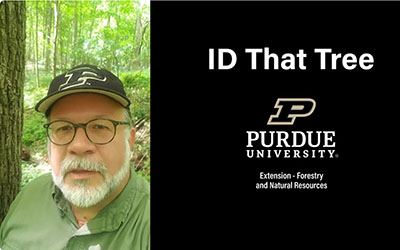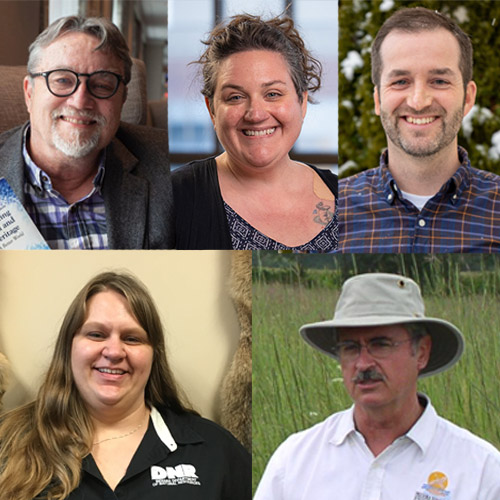FNR Graduate Student Spotlight: Francis Asare
 Francis Asare was raised in Ghana by his uncle, who was a farmer, after he lost his father at a young age. Francis never knew his mother, but his father had two other children, who were orphaned after losing both of their parents. Those two sisters as well as his uncle’s children complete Francis’ family along with a few close friends who have supported him over the years.
Francis Asare was raised in Ghana by his uncle, who was a farmer, after he lost his father at a young age. Francis never knew his mother, but his father had two other children, who were orphaned after losing both of their parents. Those two sisters as well as his uncle’s children complete Francis’ family along with a few close friends who have supported him over the years.
“My uncle supported me like every dad should do, and he inspired me to do better in life,” Asare said. “The fact that he’s getting older and needs a better life is a major factor pushing me forward. I hope to at least put some food in his mouth before God calls him. My sisters are my priority and I have to make sure they are doing well and take care of them by always staying in touch with them.”
Francis left home in January 2021 to pursue his dreams and ensure a better life for his family. After securing funding from the Purdue Department of Forestry and Natural Resources, he prepared himself, secured some loans and help from a few individuals, and left his home county. He did not, however, inform his sisters or his uncle that he was traveling to study in the United States. A month later, he broke the good news to his family. Everyone was shocked, some cried over the phone, but after that all wished him well.
Francis grew up in Abease Komfourkrom, a small village in Ghana, where much of the property, as in many rural communities in the country, is common property where anyone can use as much land as they desire for farming, and harvest or burn any wood species/trees appropriate for charcoal production. Francis was heavily involved in farming and charcoal production at the earliest stages of his life. In fact, he farmed a great deal before climate and weather conditions started to affect his crop yield. After that, Francis began to learn more about the impacts and consequences of charcoal production and unsustainable farming practices on the environment by reading newspapers and articles. He came to understand that his actions had caused harm to the environment and was scared that such actions were contributing to the global issues of climate change and variability.
While working on his bachelor of science in forest resources technology at Kwame Nkrumah University of Science and Technology (KNUST) Francis explored improvements in the charcoal industry. Before graduating in 2019, he was named as KNUST’s department of wood processing and marketing Overall Best Graduating Student (June 2019), Best Final Year Student (May 2019), Best Third Year Student (April 2018) and Student Leader of the Year (April 2018).
Francis was inspired by the knowledge that he could contribute to solving such challenging issues in Africa and the world at large by starting in his own community. Following the recommendations from his own research, he started a plantation project of approximately 50 acres, where he planted some fast-growing (short rotation) wood species (Acacia, Gmelina, Cedrela species) that could be used to supplement the indigenous, longer-rotation species that were used for charcoal production in rural communities in Ghana.
While working as an undergraduate research and teaching assistant in the KNUST department of forestry resources technology, Francis got involved with his fellow students to sensitize communities on the issues of climate change and other sustainable practices. He became president of the student chapter of the Green Africa Youth Organization, through which he continued working on climate change, disaster risk reduction, circular economy and community engagement activities related to forestry and natural resource management and transformative education.
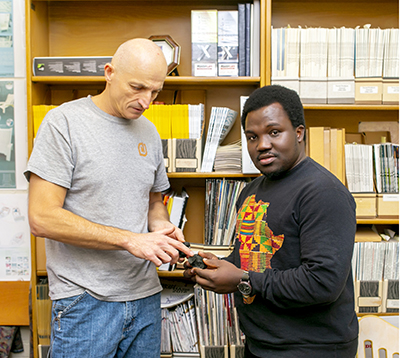 Francis decided that continuing his own education would be a vital piece in affecting in his local community.
Francis decided that continuing his own education would be a vital piece in affecting in his local community.
“I started looking for some organizations and institutions that could help me get some funding for my education. Luckily for me, I was introduced to Purdue by a friend who had the intentions of applying to the school,” Francis recalled. “I read about it and decided to give it a try. I wrote to professor Rado Gazo, who was working on the issue of forest products innovation, and since I specialized in wood processing and marketing when I was in Ghana, I had a perfect interest in his field of research. Additionally, I wanted to work with sustainable wood products and focus on adding value to forest products and other agro-industrial residues. I wanted to channel that into my community and help them better understand the trends in forestry and improve upon the sustainable life and livelihood in these rural communities. My decision to study at Purdue was because it was the first place I got an advisor who was willing to supervise my work and help me pursue my dream.”
Having lived and worked in the community alongside fellow farmers and charcoal producers in Ghana, Francis understood their plight and went to work on rectifying the environmental impact.
“In my past work, I researched the characteristics of people living in rural communities and the issues of charcoal production and how it contributes to the economy and ways we could improve on it,” Asare explained. “I also looked into the species that they were using for charcoal production and I realized that the method they were using was a very bad one. They use a traditional kiln (earth mounds), which is only 10 to 15 percent efficient, so I wanted to make sure that I promoted sustainable agriculture and biochar production. I want to come up with the technology, a conversion method, that can be used to burn the 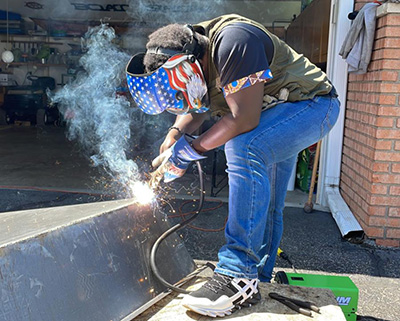 charcoal and, at the same time, be used to convert the agro-industrial residues in biochar to improve soil properties, crop production, and sequester carbon in the soil. This would result in the improvement of soil retention capacity and water holding capacity, sustainably store carbon, reduce greenhouse gas (GHG) emissions, and promote good climate. My work is centered around the conversion technologies and use of sustainable conversion technology among local small-scale farmers, in areas where charcoal production is a problem and unsustainable agricultural practices keep rising.”
charcoal and, at the same time, be used to convert the agro-industrial residues in biochar to improve soil properties, crop production, and sequester carbon in the soil. This would result in the improvement of soil retention capacity and water holding capacity, sustainably store carbon, reduce greenhouse gas (GHG) emissions, and promote good climate. My work is centered around the conversion technologies and use of sustainable conversion technology among local small-scale farmers, in areas where charcoal production is a problem and unsustainable agricultural practices keep rising.”
Francis’s research involves a multi-faceted approach, which covers the entire charcoal production system, not just the conversion.
“I consider my research interests as a system; we have the raw material, the charcoal producers, the conversion methods they use and then we have the consumer and the byproducts and how they are being used. First, I looked at the characteristics of the producers and the source of their raw materials, including the tree species they use. Then I looked at the heating value of the species used for the charcoal production and the conversion methods being used, which I am trying to improve. I have other research that will tackle how charcoal is marketed after production, and how consumers utilize the charcoal using appropriate cooking stoves. It is one thing to produce the charcoal, but it is another thing if it is effectively used. My mode of research is basically picking one item and working on that and after completion, I focus on the recommendations and relevant plans to see how they fit into another item.”
Dr. Rado Gazo, Asare’s research advisor and a professor of wood processing and industrial engineering, is part of Purdue Forestry and Natural Resources’ extension staff in addition to his teaching and research responsibilities, which is guiding Asare to make sure that his research is applicable and easy to understand for farmers and producers in his home country.
“My funding here was focused on improving upon the first-rate extension program at Purdue, where Dr. Rado has been a backbone to my degree success,” Francis said. “Everything you study, you have to transfer it to your home country. We are harvesting a lot of wood and that is not going to stop, and about 70 percent of the wood harvested in the world is used for fuel. This means that just about 30 percent of globally harvested wood is used for cabinets and wood products. In sub-Saharan Africa, the first percentage reaches about 90 to 95 percent with a severe environmental impact.”
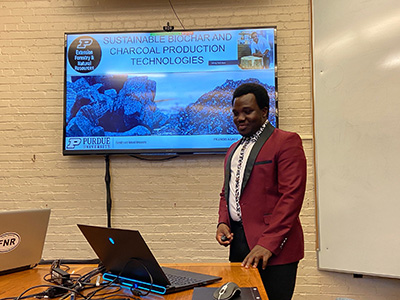 In 2022, Francis published an article “Sustainable charcoal production drive in rural communities in Ghana, West Africa” about his research which engaged industries, stakeholders, research institutions and local farmers to address climate issues arising from charcoal production. He also is first author of “Production Properties and Characterization of Charcoal from Selected Woods Species” and co-author of “Farmer-Friendly Tree-Level Lumber Value Calculator for Lumber Pricing in Forest Rehabilitation Systems,” both of which are awaiting review to be published.
In 2022, Francis published an article “Sustainable charcoal production drive in rural communities in Ghana, West Africa” about his research which engaged industries, stakeholders, research institutions and local farmers to address climate issues arising from charcoal production. He also is first author of “Production Properties and Characterization of Charcoal from Selected Woods Species” and co-author of “Farmer-Friendly Tree-Level Lumber Value Calculator for Lumber Pricing in Forest Rehabilitation Systems,” both of which are awaiting review to be published.
To relate his research back to his homeland, Asare is working with Francis Wilson Owusu, a principal research assistant at the Council for Scientific and Industrial Research at the Forest Research Institute of Ghana, who supervised his work as an undergraduate student at Kwame Nkrumah University of Science and Technology. He also is collaborating with Dr. John Lumkes, a professor in the Purdue Department of Agricultural and Biological Engineering; Dr. Eva Haviarova, FNR’s professor of wood products engineering and furniture strength design; and four engineering students. The group is working on developing Asare’s biochar conversion method.
Francis presented his master’s thesis defense on “Sustainable Biochar and Charcoal Production Technologies” on November 18, and will graduate in December 2022. His hopes to start working on his PhD with Purdue FNR in the spring of 2023, while he continues working to implement the already researched conversion technologies in Ghana.
“I have some land in Ghana I am using for a plantation of short rotation wood species for charcoal production,” Asare explains. “I am also engaging more than 1,500 local farmers in rural communities, teaching them and giving them recommendations on the sustainable practices relevant in modern agriculture and fuel production. I also want to go back to Ghana and check things on my plantation, to see how the growth is and to be around and supervise, and visit my family. If I fully implement my ideas in Ghana then I will be okay to go home.”
Francis has presented his research through several presentations and posters across the United States, ranging from the Forest Products Society and Graduate Students Association of Ghana in USA virtual conferences in 2021 to the Forest Products Society Conference in Madison, Wisconsin, in 2022. He received first place in the extension poster category at the FNR Research Symposium in April 2022, presenting on “Promoting the use of advanced technologies for sustainable charcoal and biochar production in developing countries.” In November, he received an award as part of the Purdue Student Service-Learning Grant Program.
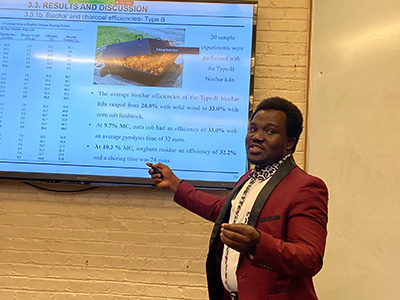 Francis is appreciative of the opportunities he has had and hopes to continue making an impact with the help of his support system at Purdue and back in Ghana.
Francis is appreciative of the opportunities he has had and hopes to continue making an impact with the help of his support system at Purdue and back in Ghana.
“You cannot make it alone,” Asare declared. “I don’t go out much and I don’t have many friends except for a few friends from church and the wood research laboratory team. We meet in the lab, in their homes and have fun eating and telling stories. At the beginning of every semester, we have fish fries or eat with my advisor and his family at their house and it is one of the best things.
“Anyone who has played a role in my life, I appreciate them a lot. However, my uncle and my family are the people that are very close that brought me to this place. I come from an agricultural background, I have worked in industry and I have intentions of making a change in my community.”




